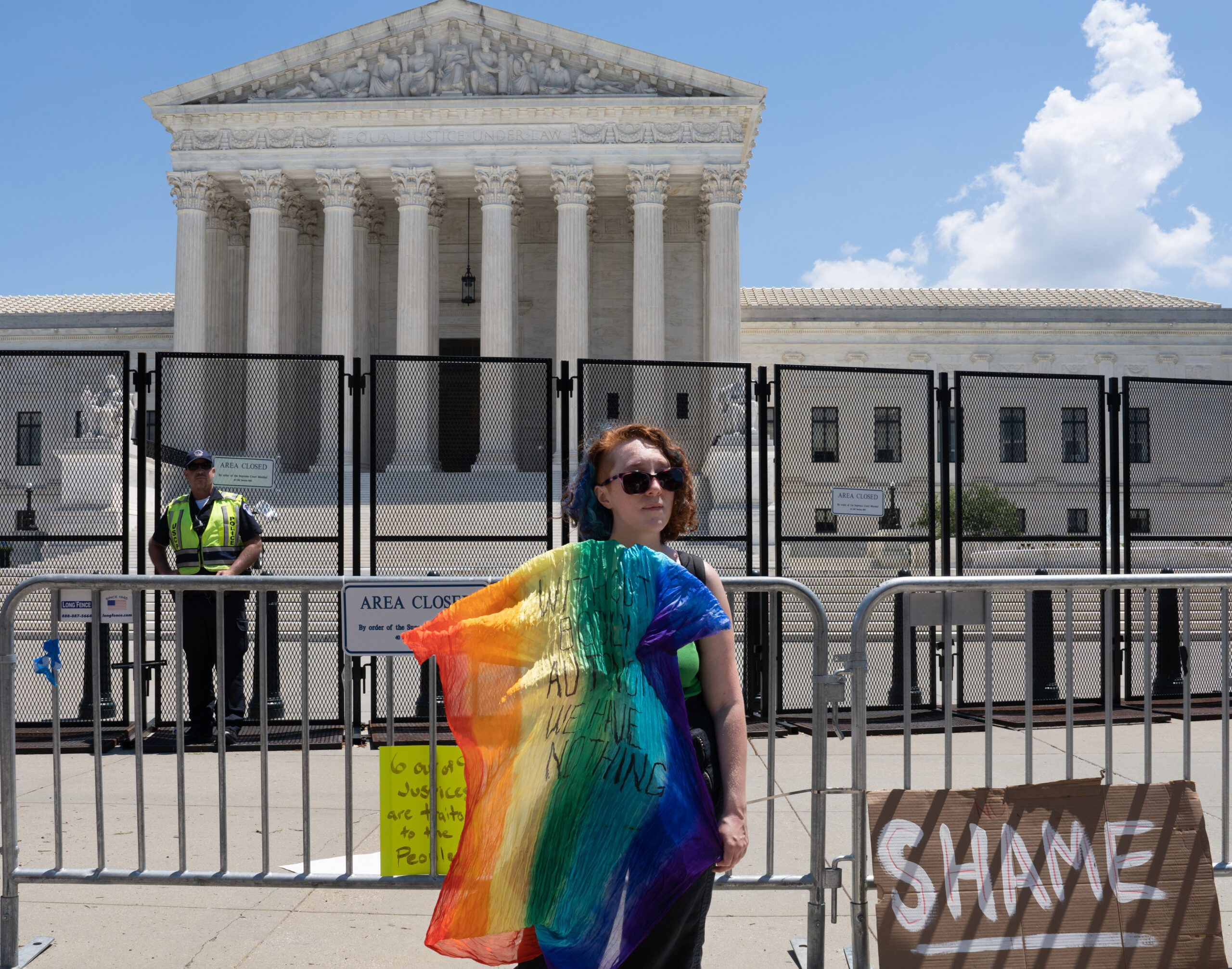Editor’s Note: We are delighted to welcome our friend Cat Williams to NPI’s Cascadia Advocate to discuss the Supreme Court’s horrific Dobbs decision, which was published last Friday. Cat holds a J.D. from Berkeley Law and is a civil litigation attorney. She currently focuses on intellectual property litigation and has previously represented clients in wage theft and domestic violence cases.
“It is time to heed the Constitution and return the issue of abortion to the people’s elected representatives.”
So writes Justice Alito in Dobbs v. Jackson Women’s Health Organization, which the Supreme Court’s six conservative members used to strike down Roe v. Wade and deny the long-recognized right to abortion.
But Justice Alito knows that gerrymandering in the vast majority of the twenty-six states that joined Mississippi in asking him to overturn Roe has cemented unfair Republican rule in state legislatures for decades to come.
Indeed, several such state legislatures already had “trigger laws” outlawing abortion for any purpose the moment Roe was overturned.
Alito pats the Court’s shoulder for championing democracy and states’ rights, when in fact Dobbs knowingly throws the reproductive rights of millions of women to the wolves — gerrymandered state legislatures. And each justice knows this.
The Dobbs majority justifies its unprincipled decision by claiming that “Roe was egregiously wrong from the start.” But Roe was a 7–2 decision. Planned Parenthood v. Casey, which preserved the essence of Roe, was a 5 4 plurality decision. Dobbs was 6–3, counting Justice Roberts’ reluctant joinder.
Thus, according to Alito, fifteen of the twenty-seven votes favoring reproductive rights in the three seminal cases — over half — were “egregiously wrong”.
This is nonsense, and antithetical to sound principles of stare decisis (“like cases are treated alike”). Traditionally, “egregiously wrong” cases are only overruled by a sizeable majority, if not unanimously. For example, Brown v Board of Education, which outlawed school segregation, was a unanimous decision.
So: Why, exactly, was Roe “egregiously wrong from the start”?
Only because there are now enough right wing votes on the Court to say so.
Dobbs, which applies the Glucksberg test (which contemplates whether a right is “deeply rooted in this Nation’s history and tradition,” and which the Court has subsequently held as “inconsistent with the approach this Court has used in discussing fundamental rights”), while simultaneously claiming that the decision “does not doubt on precedents that do not concern abortion” (apparently abandoning the question of whether those rights are “rooted in this Nation’s history and tradition”), is not rooted in sound legal principle.
Rather, it is an exercise of Republicans seizing more power years in the making.
This is not the first time members of this Court have made what turned out to be empty assurances about the future status of constitutional rights.
Each of the three Trump appointees — Justice Kavanaugh, Justice Gorsuch, and Justice Barrett — assured the American people during their confirmation hearings that Roe is well-settled law. Justice Kavanaugh stated that Roe is “settled as precedent of the Supreme Court,” and that “one of the important things to keep in mind about Roe v. Wade is that it has been reaffirmed many times.”
“Roe v. Wade is the law of the land,” Justice Gorsuch declared. “I accept the law of the land, Senator.” Perhaps most notably, Justice Barrett stated: “Judges can’t just wake up one day and say I have an agenda — I like guns, I hate guns, I like abortion, I hate abortion — and walk in like a royal queen and impose their will on the world. It’s not the law of Amy; it’s the law of the American people.”
Yet each of these three individuals — as soon as they had the opportunity to — joined in overturning what they once referred to as “settled precedent of the Supreme Court.” The irony was apparently lost on Justice Alito, who scolded the dissent’s concern over other substantive due process rights as “designed to stoke unfounded fear that our decision will imperil those other rights.”
But that fear is far from unfounded.
More than a gutting of reproductive rights and women’s rights, Dobbs is a breach of trust. Justice Clarence Thomas’s concurring opinion, while alarming, is at least an honest admission of the right wing’s agenda.
Unlike his colleagues, who are pretending that Dobbs stops at the right to abortion, Thomas disclosed that abortion is merely the first item on the agenda.
“We should reconsider all of this Court’s substantive due process precedents,” he writes, including Griswold (right to contraception), Lawrence (right to same sex intimacy), and Obergefell (freedom to marry).
In other words: those rights should not exist.
Indeed, Justice Thomas declares that substantive due process (which allows courts to establish and protect certain fundamental rights from government interference) is a “legal fiction” that “has harmed our country in many ways.”
While elected Republicans take a more covert approach to chipping away at fundamental rights, Justice Thomas’ concurrence should remind us all of what is at stake. And Dobbs should remind us that elections matter — at the federal level, they determine who will appoint and confirm (or not confirm, in the case of Merrick Garland!) those trusted with upholding our most fundamental rights. At the state level, they determine who will be trusted to protect those rights when the most powerful branches of the federal government refuse to do so.

